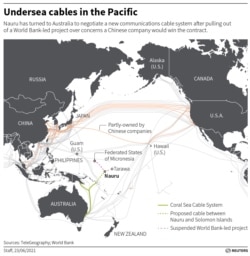The American government will reportedly help the Federated States of Micronesia (FSM) lay communication equipment in the Pacific Ocean. Two sources with knowledge of the plans spoke to Reuters. They also said FSM had refused an offer of such help from China.
The United States has taken interest in several plans in recent years to lay cables in the Pacific Ocean. Such cables can carry much more data than satellites and could sharply improve communications to island nations.
Reuters reports that FSM would use U.S. money to build a line between two of its four states, Kosrae and Pohnpei. It is similar to an earlier $72.6 million project backed by the World Bank and the Asian Development Bank.
That project had also included the states of Nauru and Kiribati, but it was dropped. Washington had raised concerns that the contract would be given to the Chinese Huawei Marine company, now called HMN Technologies.
American government officials argued that the involvement of Chinese companies in the project would threaten security in the area. Beijing has denied using cable technology for spying.
One source told Reuters that FSM would receive around $14 million from the American Rescue Plan. The U.S. Congress passed the legislation earlier this year as part of COVID-19 recovery efforts.
The United States and FSM have a long diplomatic relationship. The nations are part of the Compact of Free Association, a decades-old agreement between the United States and its former Pacific territories. Under that agreement, the American government is responsible for the island nation's defense.
The Reuters source said the U.S. money was likely meant to provide a connection to the HANTRU-1 undersea cable. That is a line used by the U.S. government that connects to the U.S. Pacific territory of Guam.
The World Bank said in a statement it was working with FSM and Kiribati on a new plan after the larger project ended with no contract awarded.
Pacific Politics
Underwater cables are one of the newest and most competitive interests between China and the U.S. in the Pacific.
While FSM has close ties to the United States, it also has long had diplomatic and trade relations with China.
China has strongly denied accusations of spying. China's Foreign Ministry said in a statement to Reuters that Chinese companies have a good record in cybersecurity.
"The so-called security threat by the U.S. is totally groundless," the statement said. "Who the 'hacker empire' really is - engaging in spying and stealing secrets - is plain to the world."
I’m Dan Novak.
Jonathan Barrett reported this story Reuters. Dan Novak adapted it for VOA Learning English. Caty Weaver was the editor.
__________________________________________________
Words in This Story
cable — n. a group of wires, glass fibers, etc., covered in plastic or rubber and used to carry electricity or electrical signals
decade — n. a period of ten years.
hacker — n. a person who secretly gets access to a computer system in order to get information, cause damage, etc. : a person who hacks into a computer system
engage in — phrasal verb. to do (something)






